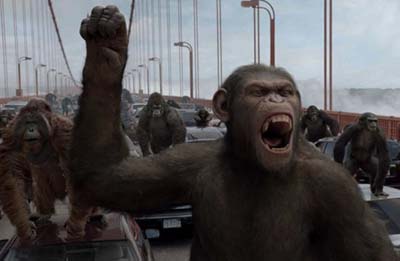 Dawn of the Planet of the Apes is so far my number one pick for the Summer ever since I watched the trailer last Winter. Whether or not I’m right will be disclosed later but overall the Summer 2014 movie season blows. There have been noticeable gaps in releases, Godzilla sucked, Amazing Spider-Man 2 was fair and the X-Men sequel wasn’t a slam dunk for me. I probably also have a strong bias for the Apes franchise because I’ve always loved the original 1968 flick. Its four followups degrade with each release. Compared to Tim Burton’s horrendous reboot though, the low-budget Battle and Conquest are high-brow affairs.
Dawn of the Planet of the Apes is so far my number one pick for the Summer ever since I watched the trailer last Winter. Whether or not I’m right will be disclosed later but overall the Summer 2014 movie season blows. There have been noticeable gaps in releases, Godzilla sucked, Amazing Spider-Man 2 was fair and the X-Men sequel wasn’t a slam dunk for me. I probably also have a strong bias for the Apes franchise because I’ve always loved the original 1968 flick. Its four followups degrade with each release. Compared to Tim Burton’s horrendous reboot though, the low-budget Battle and Conquest are high-brow affairs.
On to Rise the do-over that made this Summer’s Dawn chapter feasible.
Now or in the near future, well-meaning scientist Dr. Will Rodman (James Franco, there’s the first Sci-Fi McGuffin in the story) is trying to make a vaccine for Alzheimer’s Disease. A very noble and worthy goal, especially when his own father has the destructive sickness (a credible John Lithgow). Just as Rodman sees signs of progress through a chimpanzee named Bright Eyes, the drug’s development is scrapped thanks to Bright Eyes going ape-shit in front of the investors. Rodman’s boss is the obvious villain; he orders all the lab’s primates to be exterminated. Rodman and the ape wrangler later discover Bright Eyes’ actual source for the aggressive outburst, she was protecting her child. The drug didn’t have the side effect they feared. It’s too late though, the wrangler already put the other test animals to sleep so Rodman smuggles the baby ape out to live at his house.
Rodman’s father names the baby Caesar (from the Shakespearean play) and the two raise him in secret. Ten years pass. Caesar demonstrates great intelligence for an ape plus he can communicate by sign language. The ape’s progress leads to Rodman testing the last batches of the vaccine he stole from the lab on his father. It works! Dad is functional again, especially when he plays the piano.
Inevitably man’s genetic tampering and cruelty to animals leads to Caesar starting a primate uprising with a climatic battle on the Golden Gate Bridge. The story ends with the apes escaping into the Muir Woods and a deadly pandemic spelling the demise of humanity’s dominance.
I’ll quickly kick off with the nitpicking, and yes, I know, it’s just a movie. However, the animal rights’ losers may still use this flick as ammo in their flawed arguments. First off, apes or chimpanzees wouldn’t be used for neurological experiments this soon. Rats are the more logical choice. If there’s success, the scientists would work up to larger more compatible species long before primates. Getting monkeys, apes, etc. is very expensive plus the Western governments have regulations, hence the African poachers in the opening credits are a huge stretch. Finally, chimpanzees have proven to be ineffective in helping us test vaccines, drugs, etc. Adults are very dangerous due to their impressive strength and short fuses. They turned out to be a bust in AIDS testing, hence one of Clinton’s first tasks as president was to set up a refuge for a bunch to live out their remaining years down in Louisiana because they couldn’t go back to their original environments. Many were too adjusted to life amongst humans.
The bigger glitch is the virus element. Somehow the Alzheimer’s cure is delivered via this method. If the affliction were a virus like polio, then I could buy it yet this would only prevent healthy people from contracting the condition. Those already suffering are screwed. I need to ask my friend Dr. Deb, who has a PhD in biological sciences, on the validity of viruses delivering anything beneficial, namely genetic manipulation.
Now to the what I loved. Andy Serkis is the Laurence Olivier of motion-capture based acting. His Caesar rocks. This movie is also a rare demonstration of how today’s special effects assist or enhance the story without being the star. The original Conquest was the product of its time (early Seventies), the fourth episode in a 1968-based franchise, Hollywood didn’t spend much on makeup and CG wasn’t even imaginable. Rise serves as a worthy replacement for Conquest in the saga. The other element I enjoyed was the attention to detail with the other species: gorillas and orangutans resembling the real things, not just people wearing different colored appliances and faux fur.
Sure the story is predictable and a tad heavy-handed. It’s a precautionary Sci-Fi tale while being the new “prequel” explaining how the Planet of the Apes came into being given the world’s changes since 1968. Applause to Amanda Silver and Rick Jaffa for saving a beloved series from the turd bomb detonated on to it by Tim Burton’s textbook example of how not to reboot (or tamper) a classic franchise. If you’re fan of the original, you’ll catch all the references the writers snuck in. One I will spill is a mentioning of the USS Icarus leaving for Mars and then being reported lost.
I would highly recommend seeing this before attending Dawn of the Planet of the Apes.
